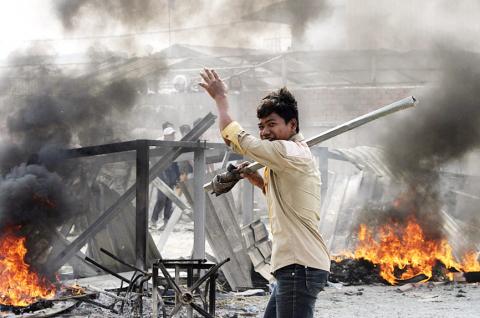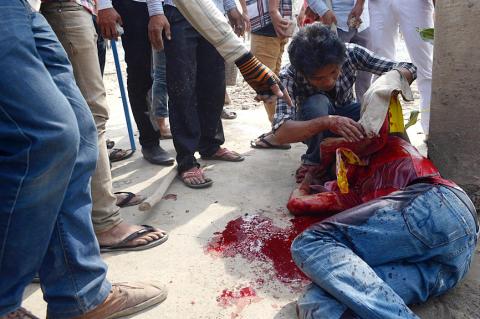Cambodian military police yesterday opened fire with assault rifles to quell a protest by stone-throwing garment factory workers demanding higher pay in a crackdown a human rights group said killed four people.
Chaos during nationwide strikes erupted for a second day as security forces were deployed to halt a demonstration by thousands of workers, who refused to move and threw bottles, stones and gasoline bombs at an industrial zone in Phnom Penh.
The clash represents an escalation of a political crisis in Cambodia, where striking workers and anti-government protesters have come together in a loose movement led by the opposition Cambodia National Rescue Party (CNRP).

Photo: Reuters
Unions representing disgruntled garment workers have joined opposition supporters protesting against the government of Cambodian Prime Minister Hun Sen to demand a re-run of an election in July last year that the opposition says was rigged.
Military police confronting the protesters fired live ammunition, journalists said, and bullet casings were later seen scattered across the ground at the scene.
The clashes took place at Canadia Industrial Park, home to dozens of factories that make clothing for Western brands.

Photo: AFP
Human rights group LICADHO described the incident as “horrific” and lambasted military police, adding that their own investigation and surveys of hospitals had found four people were killed and 21 wounded.
“We condemn this appalling use of extreme lethal force by security forces,” LICADHO director Naly Pilorge said in a statement. “Security forces must now put an immediate end to the use of live ammunition against civilians.”
Spokesmen for the national police and military police said they could not verify the number of casualties.
The CNRP, led by former Cambodian finance minister Sam Rainsy, has courted about 350,000 garment workers from nearly 500 factories across the country by promising to nearly double the monthly minimum wage to US$160 if it wins a re-run of the July election, which Hun Sen is refusing to hold.
The government is refusing to raise the wage beyond US$100 a month and has ordered factories to reopen to prevent damage to an industry worth US$5 billion a year.
TAIWANESE FIRMS
Taiwanese garment makers Eclat Textile Co (儒鴻) and Makalot Industrial Co (聚陽) shut down their Cambodian factories for a week starting on Thursday last week and relocated their production to factories in neighboring countries.
The temporary shutdown was suggested by the Garment Manufacturers Association in Cambodia, the two firms said in filings to the Taiwan Stock Exchange yesterday.
They both said the strike would have little impact on their revenue and earnings.
“We reopened our factories on Jan. 2, and some workers have come back to work. But, we will close the factories again, for the safety reasons, if things turn violent,” Makalot public relations manager Mavis Chiu (邱美惠) said by telephone yesterday.
Makalot made 2.33 million units of apparel in Cambodia in 2012, accounting for 25 percent of its total production for that year, according to the company.
Eclat said its factory shutdown will reduce its production by 140,000 pieces of apparel, but that its clients have agreed to postpone their orders.
Eclat said its production capacity in Cambodia was about 450,000 pieces of apparel a month, accounting for 5 percent of its total production.
Additional reporting by Camaron Kao

The Central Election Commission has amended election and recall regulations to require elected office candidates to provide proof that they have no Chinese citizenship, a Cabinet report said. The commission on Oct. 29 last year revised the Measures for the Permission of Family-based Residence, Long-term Residence and Settlement of People from the Mainland Area in the Taiwan Area (大陸地區人民在台灣地區依親居留長期居留或定居許可辦法), the Executive Yuan said in a report it submitted to the legislature for review. The revision requires Chinese citizens applying for permanent residency to submit notarial documents showing that they have lost their Chinese household record and have renounced — or have never

A magnitude 5.6 earthquake struck off the coast of Yilan County at 12:37pm today, with clear shaking felt across much of northern Taiwan. There were no immediate reports of damage. The epicenter of the quake was 16.9km east-southeast of Yilan County Hall offshore at a depth of 66.8km, Central Weather Administration (CWA) data showed. The maximum intensity registered at a 4 in Yilan County’s Nanao Township (南澳) on Taiwan’s seven-tier scale. Other parts of Yilan, as well as certain areas of Hualien County, Taipei, New Taipei City, Taoyuan, Hsinchu County, Taichung and Miaoli County, recorded intensities of 3. Residents of Yilan County and Taipei received

Taiwan has secured another breakthrough in fruit exports, with jujubes, dragon fruit and lychees approved for shipment to the EU, the Ministry of Agriculture said yesterday. The Animal and Plant Health Inspection Agency on Thursday received formal notification of the approval from the EU, the ministry said, adding that the decision was expected to expand Taiwanese fruit producers’ access to high-end European markets. Taiwan exported 126 tonnes of lychees last year, valued at US$1.48 million, with Japan accounting for 102 tonnes. Other export destinations included New Zealand, Hong Kong, the US and Australia, ministry data showed. Jujube exports totaled 103 tonnes, valued at

BIG SPENDERS: Foreign investors bought the most Taiwan equities since 2005, signaling confidence that an AI boom would continue to benefit chipmakers Taiwan Semiconductor Manufacturing Co’s (TSMC, 台積電) market capitalization swelled to US$2 trillion for the first time following a 4.25 percent rally in its American depositary receipts (ADR) overnight, putting the world’s biggest contract chipmaker sixth on the list of the world’s biggest companies by market capitalization, just behind Amazon.com Inc. The site CompaniesMarketcap.com ranked TSMC ahead of Saudi Aramco and Meta Platforms Inc. The Taiwanese company’s ADRs on Tuesday surged to US$385.75 on the New York Stock Exchange, as strong demand for artificial intelligence (AI) applications led to chip supply constraints and boost revenue growth to record-breaking levels. Each TSMC ADR represents